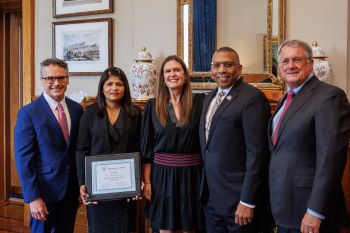
Pine Bluff, AR — Dr. Grace Ramena, associate professor and director of fish health inspection and diagnostics at the University of Arkansas at Pine Bluff, has been named an Arkansas Research Alliance (ARA) Fellow. The ARA Fellows Program recognizes distinguished university research leaders in the state with an established history of impact.
During a recent ceremony at the Arkansas State Capitol, Governor Sara Huckabee Sanders announced the new ARA Fellows, representing five research universities in the state and the state’s largest federal lab. Each ARA Fellow was nominated by the chancellor of their affiliated university and will receive a $75,000 grant paid over three years.
“Dr. Ramena brings tremendous depth to UAPB’s research and Extension agenda,” Dr. Bruce McGowan, interim dean/director for the UAPB School of Agriculture, Fisheries and Human Sciences, said. “Her work and passion for discovery and learning has branded her as one of the prolific researchers throughout Arkansas and the country, particularly considering her collaboration with the ARA, University of Arkansas for Medical Sciences, and numerous U.S. Department of Agriculture research initiatives. Her innovative research is unique not only to the aquaculture and fisheries community, but also has clinical applications that have caught the attention of the medical profession.”
Dr. Ramena will use the ARA grant to further her research pertaining to zebrafish and shrimp. In particular, the grant will fund the construction of a $50,000 custom-made recirculating aquaculture system that will benefit shrimp, baitfish and human health research projects. According to Dr. Ramena, the system will also be vital in generating extramural funding and training students. The remaining funds will be used to provide scholarships for students interested in science, technology, engineering, and mathematics (STEM) research and career opportunities.
“I am humbled to be recognized as the ARA fellow, and I express my deep gratitude to Chancellor Laurence B. Alexander, Dean McGowan, and my colleagues, collaborators, students, as well as my husband, daughter and family who made this possible,” she said.
Dr. Ramena has a doctorate in medical microbiology immunology and cell biology from Southern Illinois University, a master’s degree in biology from the University of Illinois at Springfield, and a master’s degree in aquaculture from Acharya Nagarjuna University in Guntur, India.
Prior to joining UAPB, Dr. Ramena was a post-doctoral research associate in the Department of Biochemistry and Molecular Biophysics at the Washington University School of Medicine in St. Louis, Missouri. She also worked on research projects at Southern Illinois University’s School of Medicine. Earlier in her career, she worked at a fish/shrimp health clinic at Charoen Pokphand Aquaculture in India, where she was responsible for providing shrimp/fish health certifications and technical assistance to commercial fish farmers.
Dr. Ramena began her career at UAPB in 2017 and has secured over $3 million in extramural funding to conduct multidisciplinary research projects collaborating with scientists in the U.S. Her research investigates ways to replace antibiotics in fish production due to rising drug-resistant streptococcal strains. She is working on developing safe alternatives such as peptidoglycan hydrolases (PGHs) for treating Streptococcosis in nearly 30 fish species and is patenting them for potential commercial use.
She is also collaborating with Dr. Mark Smeltzer at University of Arkansas for Medical Sciences (UAMS), Dr. David Donovan and Dr. Daniel Nelson in targeting multi-drug resistant Staphylococcus aureus with PGHs for osteomyelitis treatment. She is working with Dr. Analiz Rodriguez, a
neurosurgeon/scientist at UAMS, to develop a zebrafish glioblastoma xenograft model for understanding tumor heterogeneity and identifying therapeutic targets.
According to Dr. Ramena, she is one of only a few scientists conducting shrimp research in Arkansas. Her research on shrimp is funded by the Great Salt Lake Brine Shrimp Inc.
“The research on using immunostimulant micro and live feeds (artemia) for increased baitfish and white shrimp production holds a significant economic impact on aquaculture,” she said. “Above all, I am passionate about serving fish producers and training high school, undergraduate, graduate, and Ph.D. students to become next-generation professionals in STEM fields.”
Dr. Ramena was one of seven academics inducted into the ARA Academy of Scholars and Fellows this year. She was joined by Dr. Antiño Allen of UAMS, Dr. Heather Nachtmann of the University of Arkansas, Dr. Igor Pogribny of the National Center for Toxicological Research, Dr. Jianfeng “Jay” Xu of the Arkansas Biosciences Institute, Dr. Mary Yang of the University of Arkansas at Little Rock, and Dr. John Imig of the UAMS Department of Pharmaceutical Sciences, who was recognized as this year’s ARA Scholar.
The University of Arkansas at Pine Bluff offers all its Extension and Research programs and services without regard to race, color, sex, gender identity, sexual orientation, national origin, religion, age, disability, marital or veteran status, genetic information, or any other legally protected status, and is an Affirmative Action/Equal Opportunity Employer.








